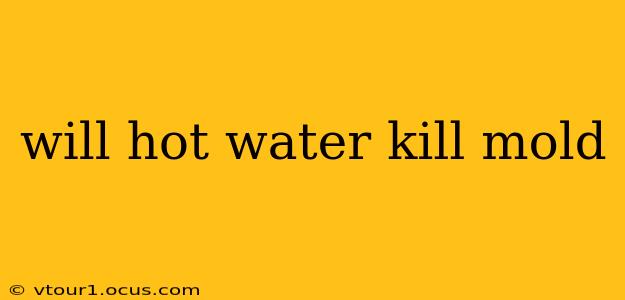Will Hot Water Kill Mold? A Deep Dive into Mold Remediation
Mold. The word itself conjures images of damp basements, musty smells, and potential health hazards. Discovering mold in your home is a serious concern, and one of the first questions many people ask is: will hot water kill mold? The short answer is: it depends. While hot water can inhibit mold growth and even kill some spores, it's not a reliable or comprehensive solution for mold remediation. Let's delve deeper into the nuances of this question.
What Happens When Mold is Exposed to Hot Water?
Mold, like most living organisms, thrives within a specific temperature range. Exposure to extremely hot water can damage the cellular structure of mold, leading to its death. However, the effectiveness hinges on several factors:
-
Temperature: The water needs to be significantly hot—boiling point (212°F or 100°C) or close to it—to effectively kill mold. Simply warm water won't do the trick.
-
Exposure Time: The mold needs sufficient exposure to the hot water to ensure complete eradication. A brief splash won't be enough.
-
Mold Type: Different types of mold have varying tolerances to heat. Some are more resilient than others.
-
Surface Area: Hot water is more effective on smooth, easily cleaned surfaces. Porous materials like drywall or wood absorb water, making it difficult for the heat to penetrate deeply enough to kill all mold.
Will Hot Water Kill All Types of Mold?
No, hot water is not a guaranteed solution for all types of mold. Some mold species are more resistant to high temperatures. Furthermore, hot water might kill surface mold but leave behind spores, which can later germinate and lead to new mold growth.
Is Hot Water a Safe and Effective Mold Removal Method?
While hot water can be part of a cleaning process for minor mold infestations on non-porous surfaces, it is not a safe or effective standalone mold removal method. Hot water can:
- Spread spores: The process of cleaning with hot water can unintentionally spread mold spores to other areas of your home, exacerbating the problem.
- Damage surfaces: Excessive heat or prolonged exposure to hot water can damage certain materials, leading to further issues.
- Fail to address the root cause: Mold growth is often a symptom of a larger problem, such as leaks or excessive humidity. Simply killing surface mold won't address the underlying conditions that are causing the mold to grow in the first place.
What are the Better Ways to Remove Mold?
For effective mold removal, especially in cases of significant infestation, you should consider:
- Professional Mold Remediation: A professional mold remediation company has the expertise, equipment, and safety protocols to safely and effectively remove mold, addressing both the visible mold and the root cause of the problem.
- Ventilation: Increasing air circulation and reducing humidity levels helps to prevent mold growth.
- Cleaning with a Mold Killer: Several commercially available mold-killing solutions can be used on affected areas, but always follow the manufacturer's instructions carefully.
- Repairing Leaks and Addressing Moisture Problems: This is crucial to preventing future mold growth.
What Should I Do If I Find Mold in My Home?
If you discover mold in your home, it's essential to act promptly. For small, isolated areas, you might attempt cleaning with a mold killer, following the manufacturer's instructions. However, if the mold infestation is extensive, or if you're unsure how to handle it safely, it is strongly recommended to contact a professional mold remediation specialist. Your health and safety are paramount. Ignoring mold can lead to various health problems.
In conclusion, while hot water can kill some mold, it's not a reliable solution for comprehensive mold removal. Professional remediation is usually the safest and most effective approach. Remember to always prioritize your health and safety when dealing with mold.
